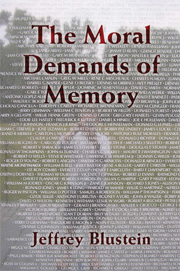1 - Memory as a Subject of Evaluative Inquiry
Published online by Cambridge University Press: 05 June 2012
Summary
When we study, discuss, analyze a reality, we analyze it as it appears in our mind, in our memory. We know reality only in the past tense. We do not know it as it is in the present, in the moment when it's happening, when it is. The present moment is unlike the memory of it. Remembering is not the negative of forgetting. Remembering is a form of forgetting.
– Milan Kundera, Testaments BetrayedELEMENTS OF A MORALITY OR ETHICS OF MEMORY
This is a book about memory and our relations to the past – our individual pasts and our collective pasts – written from the standpoints of the moral, social, and political branches of philosophy. The subject of memory has a long history within certain branches of philosophy, of course. In epistemology and metaphysics, philosophers going back to Plato have been intrigued by a phenomenon at once so familiar and yet mysterious. They have addressed such questions as: is memory a form or source of knowledge? What sort of link with the past does memory establish? Can skepticism about memory be avoided? Is our concept of the past derived from memory, or does memory presuppose a concept of the past?
Since Locke, memory has also played a central role in philosophical discussions of the unity and continuity of the self. However, evaluative inquiry about memory has been curiously neglected by philosophers, at least those working within the analytic, or the Anglo-American, tradition.
- Type
- Chapter
- Information
- The Moral Demands of Memory , pp. 1 - 56Publisher: Cambridge University PressPrint publication year: 2008

